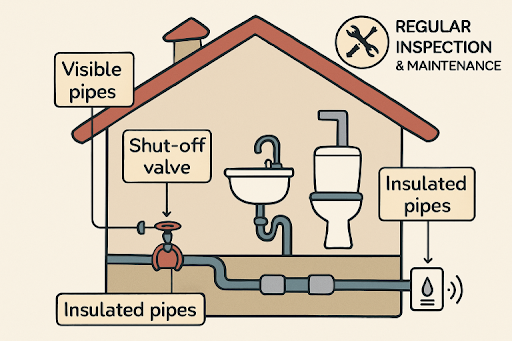Key Takeaways
- Regular inspections and maintenance can prevent major plumbing issues.
- Proper usage and disposal practices protect your plumbing system.
- Being prepared for emergencies minimizes potential damage.
Table of Contents
- Introduction
- Regular Inspections
- Proper Disposal Practices
- Monitor Water Pressure
- Insulate Exposed Pipes
- Know Your Main Shut-Off Valve
- Install Leak Detection Devices
- Maintain Your Water Heater
- Educate Household Members
Introduction
Plumbing disasters can quickly turn a peaceful home into a scene of chaos, with water damage and repair bills piling up fast. Preventative, informed maintenance is your best defense against leaks, clogs, and bursts. Following a few innovative strategies and getting the proper support, you can safeguard your living space, avoid costly emergencies, and enjoy peace of mind. If you want expert guidance or routine service, the professionals at https://lutzplumbing.com/ offer trusted solutions for every home plumbing need.
Committing to regular inspections, careful usage habits, and emergency preparedness puts you in control of your plumbing system. Not only can you stop minor issues from becoming disasters, but you’ll also extend the life and efficiency of your fixtures and appliances by making preventative care part of your home’s routine.
Regular Inspections
Staying proactive with plumbing inspections dramatically lowers your risk of sudden issues. At least twice a year, examine exposed pipes, under-sink cabinets, and around every fixture for leaks, corrosion, and moisture. Identifying trouble spots early—like a slow drip, damp drywall, or rust on pipes—can spare you from water-damaged floors and walls. Plumbers can also use cameras or thermal imaging to spot hidden issues, making inspections a wise investment for every homeowner. This guide from This Old House is exceptionally comprehensive and provides more tips on what to look for during an inspection.
Proper Disposal Practices
Caring for your drains means being mindful of what you put down them. Flushing wipes, paper towels, feminine products, or cotton swabs can cause major plumbing and municipal sewage system blockages. In the kitchen, grease, coffee grounds, and eggshells may seem harmless, but can accumulate over time, creating tenacious clogs. Always dispose of grease in sealed containers in the trash, and use drain strainers to catch food scraps. Education and clear reminders can keep everyone in the household on the same page and protect your plumbing for years to come.
Monitor Water Pressure
Healthy water pressure makes daily routines easier, but excessive pressure wears out pipes, joints, and appliances. Most homes should have pressure readings between 40 and 80 psi; anything above that may signal underlying issues or set your home up for leaks and burst fittings. Check your water pressure with an inexpensive gauge (available at hardware stores), and if you see consistently high readings, contact a professional to install a pressure-reducing valve. The Forbes Home water pressure guide is helpful for troubleshooting pressure issues.
Insulate Exposed Pipes
Winter’s freezing temperatures can spell disaster for unprotected pipes. Burst pipes require immediate repair and can cause extensive water damage to your home’s structure or foundation. Using pipe sleeves or heat tape, insulate pipes in unheated areas, including garages, basements, and crawl spaces. Insulation is especially vital in climates prone to hard freezes, but it is a good practice anywhere pipes are exposed to cold air. Look for drafts and seal cracks that could supply cold air to vulnerable piping.

Know Your Main Shut-Off Valve
Quick action makes all the difference in a plumbing emergency, like a burst pipe or overflowing appliance. Locate your home’s main water shut-off valve now, before disaster strikes. Typically found in basements, crawl spaces, or just outside your home, this valve can immediately cut off the water supply to minimize the extent of a leak or flood. Family members, babysitters, and even older children should know how to find and operate the valve. A simple family walkthrough can save thousands in repair costs and protect cherished belongings.
Install Leak Detection Devices
The latest smart-home technology can transform the way you protect your plumbing. Leak detection devices, often equipped with alarms and Bluetooth/Wi-Fi connectivity, can alert you on your smartphone at the first sign of moisture. More advanced systems automatically shut off your water supply in case of a significant leak. These devices are handy for detecting issues behind walls or basements where problems might go unnoticed for weeks. Consider installing detectors near water heaters, under sinks, or in laundry rooms for comprehensive protection.
Maintain Your Water Heater
Water heater malfunctions are a top cause of water damage in many homes. Annually, flush your tank to clear sediment that hinders efficiency and can cause overheating or corrosion. Inspect the pressure relief valve for proper operation and check for any leaks or signs of rust on the exterior. If you notice noisy operation or inconsistent water temperatures, get the water heater professionally checked—sometimes a minor, early repair can prevent complete tank failure.
Educate Household Members
Plumbing care isn’t a solo responsibility. Educate everyone in your household about good plumbing practices: what not to flush, how to recognize early warning signs of trouble, and what to do in an emergency. Make it clear that reporting strange noises, slow drains, or unexpected moisture right away can prevent severe damage. A quick briefing for new family members or visitors makes a significant difference in keeping your home safe and dry.
Implementing preventative plumbing strategies helps you save money, protect your home’s value, and create a safer environment year-round. Whether handling minor maintenance yourself or calling in the professionals, staying proactive is the most innovative way to prevent disasters from catching you off guard.



